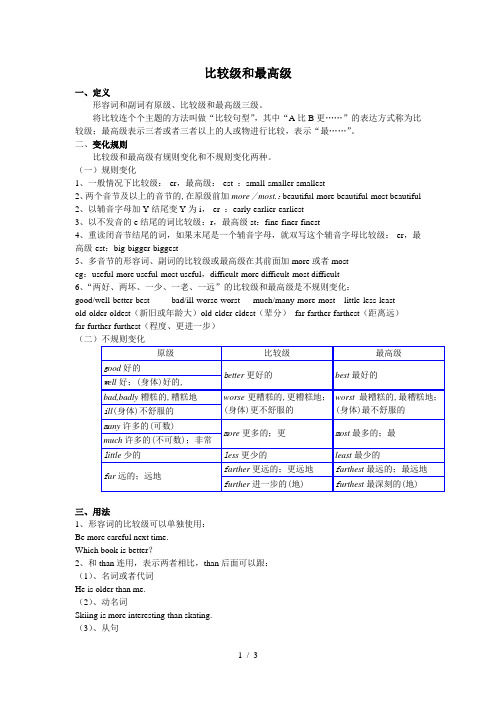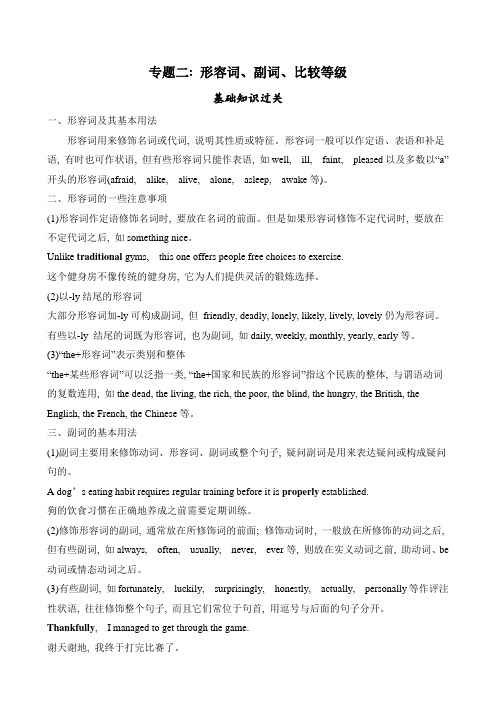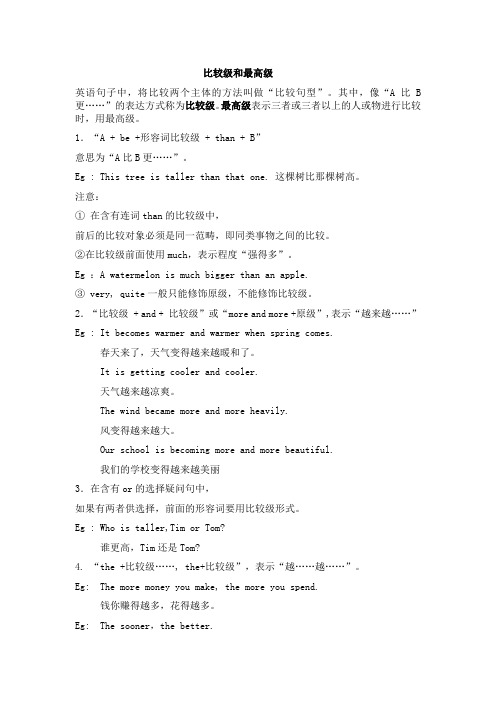倍数表达法和比较等级
- 格式:doc
- 大小:55.00 KB
- 文档页数:6

专题05 形容词和副词养成良好的答题习惯,是决定高考英语成败的决定性因素之一。
做题前,要认真阅读题目要求、题干和选项,并对答案内容作出合理预测;答题时,切忌跟着感觉走,最好按照题目序号来做,不会的或存在疑问的,要做好标记,要善于发现,找到题目的题眼所在,规范答题,书写工整;答题完毕时,要认真检查,查漏补缺,纠正错误。
总之,在最后的复习阶段,学生们不要加大练习量。
1.熟练掌握形容词和副词的句法功能和分类;2.掌握形容词、副词比较级和最高级的规则变化和不规则变化:3.掌握修饰比较级和最高级的标志词和相关句式;4.掌握倍数表达法;5.掌握形容词后缀、形容词变副词构词法考点一形容词和副词的用法1.形容词的用法:修饰名词作定语;跟在系动词后作表语;跟在宾语后作宾补;还可用作状语。
*Having been praised by the teacher, the little girl ran back home, happy and satisfied.被老师表扬之后,这个小女孩跑回了家,既开心又满足。
2.副词的用法:修饰动词;修饰形容词或副词;修饰整个句子,单独作状语。
*(2022·新高考全国卷Ⅰ)I firmly believe that you will finish your run if you bravely face this challenge.我坚信,只要你勇敢地面对这次挑战,你一定能跑完全程。
[名师点津] 有些副词如fortunately、luckily、surprisingly、honestly、actually、personally等作评注性状语时往往修饰整个句子,对整个句子进行说明或解释,表示说话人的态度与看法。
通常位于句首,常用逗号与句子分开。
考点二形容词变副词的规则[、ugly、silly、timely等。
考点三形容词和副词的比较等级(一)比较级和最高级的构成1.规则形式(1)单音节以及少数双音节形容词和副词,在原级后加er、est构成比较级和最高级,如hard—harder—hardest。

考点06 形容词和副词高考频度:★★★★★考向一形容词、副词的基本用法1。
形容词作状语表示伴随或结果,并不表达动作的方式.After the long journey,the three of them went back home,hungry and tired。
经过长时间旅行后,他们三个回到家,又饿又累。
2。
有些副词还可以作连词,作副词时常放在句末。
如:though,(ever)since,in case等He is old。
He works hard,though.=Though he is old,he works hard。
虽然他年事已高,但他工作还是很努力.3.有些副词置于句首可修饰全句,作评注性状语。
如:obviously,naturally,surprisingly 等Fortunately,he was not drowned and was saved by the PLA.幸运的是,他没被淹死,被解放军给救了。
Happily for her,her stepmother was kind to her.高兴的是,她的继母对她很好。
4.can not/never 与enough 或too连用表示:无论怎样都不过分;越……越好.—I was riding alone in the street and all of a sudden,a car cut in and knocked me down。
——我正在大街上独自一人骑自行车,突然一辆小汽车强行超车把我撞倒了。
—You can never be too careful in the street.——在大街上你越小心越好。
1. ________,she is the sort of woman to spread sunshine to people through her smile。
A. Shy and cautious B。

比较级和最高级一、定义形容词和副词有原级、比较级和最高级三级。
将比较连个个主题的方法叫做“比较句型”,其中“A比B更……”的表达方式称为比较级;最高级表示三者或者三者以上的人或物进行比较,表示“最……”。
二、变化规则比较级和最高级有规则变化和不规则变化两种。
(一)规则变化1、一般情况下比较级:-er,最高级:-est :small-smaller-smallest2、两个音节及以上的音节的,在原级前加more/ most.:beautiful-more beautiful-most beautiful2、以辅音字母加Y结尾变Y为i,-er :early-earlier-earliest3、以不发音的e结尾的词比较级:r,最高级st:fine-finer-finest4、重读闭音节结尾的词,如果末尾是一个辅音字母,就双写这个辅音字母比较级:-er,最高级-est:big-bigger-biggest5、多音节的形容词、副词的比较级或最高级在其前面加more或者mosteg:useful-more useful-most useful,difficult-more difficult-most difficult6、“两好、两坏、一少、一老、一远”的比较级和最高级是不规则变化:good/well-better-best bad/ill-worse-worst much/many-more-most little-less-leastold-older-oldest(新旧或年龄大)old-elder-eldest(辈分)far-farther-farthest(距离远)far-further-furthest(程度、更进一步)三、用法1、形容词的比较级可以单独使用:Be more careful next time.Which book is better?2、和than连用,表示两者相比,than后面可以跟:(1)、名词或者代词He is older than me.(2)、动名词Skiing is more interesting than skating.(3)、从句I was a better singer than he was.四、句型注意:比较级中为了避免重复,常用one/that/those 替代名词。

专题二: 形容词、副词、比较等级基础知识过关一、形容词及其基本用法形容词用来修饰名词或代词, 说明其性质或特征。
形容词一般可以作定语、表语和补足语, 有时也可作状语, 但有些形容词只能作表语, 如well, ill, faint, pleased以及多数以“a”开头的形容词(afraid, alike, alive, alone, asleep, awake等)。
二、形容词的一些注意事项(1)形容词作定语修饰名词时, 要放在名词的前面。
但是如果形容词修饰不定代词时, 要放在不定代词之后, 如something nice。
Unlike traditional gyms, this one offers people free choices to exercise.这个健身房不像传统的健身房, 它为人们提供灵活的锻炼选择。
(2)以-ly结尾的形容词大部分形容词加-ly可构成副词, 但friendly, deadly, lonely, likely, lively, lovely仍为形容词。
有些以-ly 结尾的词既为形容词, 也为副词, 如daily, weekly, monthly, yearly, early等。
(3)“the+形容词”表示类别和整体“the+某些形容词”可以泛指一类, “the+国家和民族的形容词”指这个民族的整体, 与谓语动词的复数连用, 如the dead, the living, the rich, the poor, the blind, the hungry, the British, the English, the French, the Chinese等。
三、副词的基本用法(1)副词主要用来修饰动词、形容词、副词或整个句子, 疑问副词是用来表达疑问或构成疑问句的。
A dog’s eating habit requires regular training before it is properly established.狗的饮食习惯在正确地养成之前需要定期训练。


比较级和最高级英语句子中,将比较两个主体的方法叫做“比较句型”。
其中,像“A比B 更……”的表达方式称为比较级。
最高级表示三者或三者以上的人或物进行比较时,用最高级。
1.“A + be +形容词比较级 + than + B”意思为“A比B更……”。
Eg : This tree is taller than that one. 这棵树比那棵树高。
注意:①在含有连词than的比较级中,前后的比较对象必须是同一范畴,即同类事物之间的比较。
②在比较级前面使用much,表示程度“强得多”。
Eg :A watermelon is much bigger than an apple.③ very, quite一般只能修饰原级,不能修饰比较级。
2.“比较级 + and + 比较级”或“more and more +原级”,表示“越来越……”Eg : It becomes warmer and warmer when spring comes.春天来了,天气变得越来越暖和了。
It is getting cooler and cooler.天气越来越凉爽。
The wind became more and more heavily.风变得越来越大。
Our school is becoming more and more beautiful.我们的学校变得越来越美丽3.在含有or的选择疑问句中,如果有两者供选择,前面的形容词要用比较级形式。
Eg : Who is taller,Tim or Tom?谁更高,Tim还是Tom?4. “the +比较级……, the+比较级”,表示“越……越……”。
Eg: The more money you make, the more you spend.钱你赚得越多,花得越多。
Eg: The sooner,the better.越快越好。
5. 表示倍数的比较级用法:①. A + be +倍数+ times + the + 形容词对应名词形式+ of + B. Eg: The new building is three times the height of the old one. 这座新楼比那座旧楼高三倍。
专题五形容词和副词+比较等级重难点分析形容词和副词的比较等级是英语高考语法填空的常考点,命题形式一般是用所给词语的适当形式填空;若是需要填more, most或fewer, less, least时,可能也会不给出原级。
系动词后接形容词作表语和一些常用副词(seldom, even, enough, never, hardly)也是高考的热点之一。
一、形容词和副词在句中的作用1.形容词在句中通常作定语、表语和补语。
如:English is a useful language.英语是一门有用的语言。
(作定语)English is useful.英语很有用。
(作表语)I find English useful.我觉得英语很有用。
(作补语)2.副词在句中作做状语,修饰动词、形容词、另一副词、介词短语,或者整个句子。
如:He walked quickly in order to get there on time.他为了按时到达那里,走得很快。
(修饰动词walked)He walked very quickly.他走得很快。
Obviously, I believe we can win it. 显然,我相信我能够赢得胜利。
二、形容词和副词的比较等级1. 形容词副词的规则变化。
(1) 一般在词尾直接加er或est。
如:long—longer—longest。
(2) 以不发音的字母e结尾的,在词尾直接加r或st。
如:nice—nicer—nicest。
(3) 以辅音字母+y结尾的,把y变为i,再加er或est。
如:heavy—heavier—heaviest。
(4) 以“一个元音字母+一个辅音字母”结尾的重读音节,双写末尾这个辅音字母,再加er或est。
如:big—bigger—biggest。
(5) 部分双音节词和多音节词分别在原级前加more构成比较级,加most构成最高级。
如:slowly—more slowly—most slowly;beautiful—more beautiful—most beautiful。
初中英语形容词副词比较级最高级变化规则篇一:初中英语形容词副词比较级和最高级知识总结.doc形容词的比较等级和最高等级:形容词的比较级和最高级的构成规则变化:2.多音节词和部分双音节词在其前面加more或 most。
如:原级比较级最高级useful more useful most useful difficultmore difficult most difficult delicious more delicious most delicious3 总结为“两好,两坏,两多,一少,一老,一远” 不规则。
注意:few--fewer--fewest healthy--healthier----healthiestfriendly---friendlier---friendliest crowded---more crowded---most crowded 改错:1,Lesson 9 is more easier than Lesson 10.2, My mother is younger than your.3, He is one of longest boys in hisclass.4,The boy doesn’t draw much well.5,Betty is the youngest on the three girls.6,Tom runs faster than any other girl in hisclass.7,There is fewer bread in the fridge.8. Mother is the busiest of my family.9,Jim is shorter of the two boys.10,You can jump very higher on the moon than on the earth. (一)形容词比较级的用法1.形容词的比较级可以单独使用: Be more careful next time. 下次小心点。
英语语法 --- 比拟级和最高级的用法在英语中通常用以下方式表示的词: 在形容词或副词前加more( 如 more natural,more clearly ) 或加后缀 -er(newer,sooner ) 。
典型的是指形容词或副词所表示的质、量或关系的增加。
英语句子中,将比拟两个主体的方法叫做“比拟句型〞。
其中,像“A 比 B 更⋯⋯〞的表达方式称为比拟级;而“A 最⋯⋯〞的表达方式那么称为最高级。
组成句子的方式是将形容词或副词变化成比拟级或最高级的形态。
一、形容词、副词的比拟级和最高级的构成规那么1.一般单音节词和少数以 -er ,-ow 结尾的双音节词,比拟级在后面加 -er ,最高级在后面加 -est ;〔1〕单音节词如: small →smaller →smallest short →shorter →shortesttall →taller →tallest great →greater →greatest〔2〕双音节词如: clever →cleverer →cleverest narrow →narrower →narrowest2.以不发音 e 结尾的单音节词,比拟在原级后加 -r ,最高级在原级后加 -st ;如:large →larger →largest nice →nicer →nicest able →abler →ablest 3.在重读闭音节〔即:辅音+元音+辅音〕中,先双写末尾的辅音字母,比拟级加 -er ,最高级加 -est ;如: big →bigger →biggest hot →hotter →hottest fat →fatter →fattest 4.以“辅音字母+ y〞结尾的双音节词,把 y 改为 i ,比拟级加 -er ,最高级加 -est ;如: easy→easier →easiest heavy →heavier →heaviestbusy→busier →busiest happy →happier →happiest5.其他双音节词和多音节词,比拟级在前面加more,最高级在前面加most;如: beautiful →more beautiful →most beautifuldifferent →more different →most different easily→more easily →most easily注意:〔1〕形容词最高级前通常必须用定冠词the ,副词最高级前可不用。
形容词与副词的比较级,最高级和原级的用法大多数形容词和副词有比较级和最高级的变化,即原级、比较级和最高级,用来表示事物的等级差别。
原级即形容词的原形,比较级和最高级有规则变化和不规则变化两种。
1) 规则变化单音节词和少数双音节词,加词尾-er,-est来构成比较级和最高级。
2) 不规则变化原级比较:as+形容词或副词原级+as1)在否定句或疑问句中可用so… as。
He cannot run so/as fast as you.2)当as… as 中间有名词时采用以下格式as +形容词+ a +单数名词\ as + many/much +名词This is as good an example as the other is.I can carry as much paper as you can..3)用表示倍数的词或其他程度副词做修饰语时,放在as的前面。
This room is twice as big as that one.Your room is the same size as mine.4)倍数表达法▲A is three(four, etc.)times the size(height, length etc.)of B.The new building is four times the size(the height)of the old one.这座新楼是那座旧楼的四倍大(高)/这座新楼比那座旧楼大(高)三倍。
▲A is three(four, etc.)times as big(high, long, etc.)as B.Asia is four times as large as Europe. 亚洲是欧洲的四倍大/亚洲比欧洲大三倍。
▲A is three (four, etc.)times bigger(higher, longer, etc.)than B.Your school is three times bigger than ours.你们的学校比我们的学校大三倍。
一倍数表达法是历届高考的热点。
当我们要表达甲是乙的几倍时,通常可使用以下句型:1. 倍数+ as + 形容词或副词的原级+ as + 其他。
这种结构又常演变成下列两类:①倍数+ as + many + 可数名词复数+ as;②倍数+ as +much + 不可数名词+ as。
如:There are seven times as many people as I expected.是我预料的人数的七倍。
There is five times as much coffee in this glass as in that one.这个杯子里的咖啡是那个杯子里的五倍。
2. 倍数+ 形容词(或副词)的比较级+ than + 其他。
如:The hall is five times bigger than our classroom. 这个大厅的面积比我们教室大五倍。
3. 倍数+ the size / height / length / width. etc. + of + 其他。
如:This road is six times the length of that one. 这条路是那条路的六倍长。
4. 计量名词+ of + 名词+ be +倍数+ that + of + 其他。
如:The size of the newly broadened square is four times that of the previous one.新扩建的广场为以前的四倍大。
5. 倍数+what从句。
如:The production is now three times what it was ten years ago.现在的产量是十年前的三倍。
6. 倍数+ more + 名词+ than +其他。
如:There are nine times more books in his bag than in yours.他书包里的书比你书包里的书多九倍。
7. 其他表达。
如:She’s twice/ double my age. 她的年龄是我的两倍。
The average income of the staff has been increased by 50 percent compared with last year.与去年相比,该单位职工的收入已增加了50%。
He runs faster than me by three times. 他跑得比我快三倍。
【考查方向】1)倍数在句中的位置一般放在第一个as前面或比较级前面或名词前面。
2)用times表示倍数时,一般只限于表示包括基数在内的三倍或三倍以上的数。
表示两倍可以用twice或double,一倍用once。
二、重要的比较结构用法归纳1. as…as 结构。
该结构的意思是“与…一样”,其间应接形容词原级,不能用比较级或最高级。
如:He is as tall as his father. 他与他父亲一样高。
He is as busy as before. 他还是像以前那样忙。
在否定句中第一个as也可换成so,其意为“不如”:He is not as [so] tall as his father. 他不如他父亲高。
He is not as [so] busy as before. 他不像以前那样忙。
2. more and more与the more…, the more…:前者表示“越来越……”,后者表示“越……,越……”。
如:Our country is getting more and more powerful. 我们国家越来越强大。
The more we get together, the happier we will be. 人聚得越多,我们越快活。
3. more than 与less than:前者“(指数量)多于”、“不只是”、“非常”等,后者表示“少于”、“比……少”。
如:I’ve known him for more than 10 years. 我已认识他10多年了。
He is more than a father to her. 他待她胜过父亲。
She was more than kind to us. 她对我们很友好。
It cost me less than 10 pounds. 我买它没要上10英镑。
She eats less than she should. 她吃得比她应该吃的少。
4. more …than 与less…than:前者表示“比……多,比……更”,后者表示“比……少,不如……”。
如:He has more books than me. 他的书比我多。
He is more careful than the others. 他比其他人更仔细。
I got less money than the others did. 我比别人得到的钱少。
注:两者均可表示“与其……不如”,但词序不同。
如:He is less a teacher than an expert. / He is more an expert than a teacher. / He is not so much a teacher as an expert. 与其说他是老师,不如说他是专家。
5. “no+比较级+than”结构:这类结构的实际意思是对待比较的两个对象进行否定,相当于该原级形容词或副词使用as…as结构的意思。
如no better than = as bad as,意为“与……一样不好”,no faster than = as slow as,意为“与……一样不快”,no taller than = as short as,意为“与……一样不高”等。
6. no more than与not more than:两者均可表示数量,前者表示“仅仅”、“只有”(= only),强调少;而后者表示“不多于”、“至多”(= at most)。
如:It is no more than five miles to the station. 去车站只有5英里。
It is not more than five miles to the station. 去车站最多5英里。
二、使用比较等级的三点注意1. 使用比较等级的基本原则:不作比较用原级,两者比较用比较级,多者比较用最高级。
如:He is very tall. 他很高。
(尽管“很高”,但没有比较,故用原级)He is very short, but taller than me. 他很矮,但比我高。
Among the three short girls, Mary is the tallest. 在这三个矮姑娘中,玛丽是最高的。
2. 不能使用双重比较等级:即构成比较级时不能既在词尾加-er,又在其前加more;构成最高级时不能既在词尾加-est,又在其前加most。
如:误:His English is more better than mine.正:His English is much better than mine. 他的英语比我的英语好多了。
虽不能说more better, most earliest 之类的,但可用“比较级+and+比较级”这样的形式:It’s getting warmer and warmer. 天气越来越暖和了。
The city is becoming more and more beautiful.这个城市变得越来越美丽了。
3. 使用比较等级要合乎逻辑。
请看下面两道题:(1) Her music is more beautiful than ______.A. meB. youC. usD. his此题应选D,其中的his=his music。
因为从逻辑上说,应该是her music与his music作比较,而不是her music与me, you, us比较。
(2) China is larger than ______ country in Asia.A. anyB. otherC. any otherD. any others此题应选C,因为China也在Asia范围内,所以应在any后加上other,以排除自己比自己大的不合理逻辑。
◆典型陷阱题分析◆1. How beautifully she sings! I have never heard _____ voice.A. a betterB. a bestC. the betterD. the best【陷阱】容易误选D,认为最高级前要用定冠词。
【分析】其实此题最佳答案为A,该句可视为…I have never heard a better voice than her voice 之省略,全句句意为“她唱得多好啊!我从未听过她这么好的声音”。
请再看以下类似的实例:He is fine, never better. 他很好,比以往任何时候都好。
This bird is really lovely. I’ve never seen a finer one. 这只鸟真可爱,我从未见过这样好看的鸟。
比较以下试题,情形也大致相同:(1) “I’ve never found a better job.” “_______.”A. I don’t think soB. Too badC. CongratulationsD. Don’t worry答案选C,I’ve never found a better job可视为I’ve ne ver found a better job than this job 之省略,句意为:我从来没有找到比这份工作更好的工作,即这是我所找到的最好的工作。
(2) “What do you think of the service here?” “Oh, ______. We couldn’t have found a better place.”A. too badB. sorryC. wonderfulD. impossible答案选C。
We couldn’t have found a be tter place 可视为We couldn’t have found a better place than this place,其意为“我们不可能找到一个比这个地方更好的地方”,即“这是我们所能找到的最好的地方”。
(3) Boris has brains. In fact, I doubt whether anyone in the class has _____IQ.A. a highB. a higherC. the higherD. the highest答案选B,句意为“……我怀疑班上有没有哪个人比他智商更高”,即“我认为他可能是班上智商最高的”。